Ramona Fabri, Hungary (she/her)
18 September 2025
Can we talk a little bit about your childhood, about your growing up? You are Roma from Hungary, yeah?
Exactly.
Your mother is Roma, your father is Roma, or?
My mother is Roma and my father is non-Roma. So, that side of the family is Roma, yeah.
Can you describe to me how growing up was?
We lived in Borsod County, which is one of the poorest counties in Hungary, and also, I think it has the largest Roma population in Hungary, in a little town called Onga. And I spent, let's say, half of my childhood there, and we lived in a house together with my grandma and with the sisters of my mother, some of them, and also with their child, their children. So there, I mean, I have a lot of cousins, and we lived there together. It was actually a pretty nice childhood in that sense that we were together, like all of us together, and on that side, I have just nice memories.
And then after, we moved to the other side of Hungary, like, Vas County, because my dad got a job abroad to support us more, to have a more financially stable background, and so I changed school and when we got there, to this little town, there were two schools, one for…one was a church school and the other was the state school, the public school, let's say. And we got into the church school firstly, and then we had to change again school because my sister, she was…well…I don't know the right word, abused? Let's say abused by her classmates because of, because she's Roma, and, well, the reason that she was and me not was because I always had like a lighter colour and she hasn't, and then we had to change school again and then after I got into high school in that county, like, I think it's a common experience for many of us that obviously I was the only Roma…like, as you continue your studies, as you go, like, let's say, higher education-wise, less and less people are Roma around you. So, at high school already, I was the only one, and then I went to university where, again, I was the only one.
Did you have any problems because you were in Roma in your neighbourhoods and your country where you grew up?
As I mentioned, we had a big family and some of us, like me, I really had more lighter colour back then than now. So of course, I live with this, you know, passing at that time. And there are some things, certain things that I remember. Like in my school, again, it's very important that it was back then because now in Hungary, everybody's, like most of the places, there is segregation on a huge level. But at that time, it was like partially segregated, let's say, but not very strictly based on ethnicity, right? Like, it was like based on the, like, the level of the children, like how can they cooperate and… which is of course also somehow connected to certain things like money and how you are able to support your child. But back then, school wise, I remember that I was not the only Roma in our class. So, I don't really remember that I would have problems with that, and also, we did not live in the Roma settlement in that little town. We lived somewhere else, like as people say, like on the white streets [laughs], so we lived in the white streets. I remember, of course, that we were poor, like economic-wise, of course, there were struggles. Everyone struggled. But I don't… I can't recall like a thing that was especially based on being a Roma, like, that was a struggle for me. I can recall things when we moved to the other county, when, as I told you, my sister was let's say harassed by the other kids, like hurt by the other kids, for being Roma, and also, it's like, not directly, but in my surroundings, as I grew up, I heard many things. People, how people are talking about Roma in general, because they thought I'm not Roma. So, yeah.
Can you tell me when did you know… like, everybody that I’ve spoken with knew, not a precise date of course, but a period when they learned about themselves that they are LGBTQ. Do you remember yours?
Yes, there was a period certainly that I would call that discovering. I think it was the end of high school…like, the last year of the high school. I went to a five-year bilingual high school, so I was around 18, 19, when I was, like pretty sure that was the time. Of course, before that, one year or two years before that, I was like already thinking a lot about it.
Like, “what is happening? Why am I the only one in my surroundings of girlfriends who is just not attracted at all to men in general?” I was like, “okay, what can we, maybe I just didn't find someone, maybe it's me, I don't know.” But I realised that I have a different connection with girls in general. I think I had my first crush, or I don't know, love, and I didn't even realise at the time. Like I was not even thinking about it like it can be a love. Like, my brain just separated it into a totally different box. Like, yes, we are friends, but girl friends are doing that. Like, yeah, we are holding friends. Yes. Girls kiss sometimes, girls are doing things sometimes, and because, to be fair I never – I think, let's say never, or if I saw then the representation, I'm sure it was very prude – so until that point, I'm not even sure if I knew what does that mean to be lesbian or, like, there was no discussion about that at all. Not in my surrounding, not in the television, not nowhere. Like, I could not see [laughs] I remember there was a point – it's so silly, but I really didn't see anything like related to this topic – so, at the dorm where I lived during high school, I knew that there are like girls who are like, I guess they were lesbians, and they had short hair, you know? And that's the only representation I saw so far, and maybe in some movies, you know some like, some movies you can see a certain representation that you just can't…you know, you don't feel like that, or being very masculine or stuff like that you see.
And I was thinking like, “if I am lesbian, then do I have to cut my hair? Then do I have to do…” I swear, I didn't know. I just didn't know at that point. I know it's so silly, so silly, but at that point in my life, I had these thoughts because I just didn't know nothing about it, like nothing. And of course, as I grew, I learned much more things about that, and I know that it has nothing to do with your appearance. It has nothing to do with like to [laughs] actually to anything. But yeah, but at that point, I was like, wow, then I have to be a certain person to fit in the stereotypes, to fit to the expectation of the society and to your environments.
Did you get, like, problems because of Roma heritage or anything when you were coming out with your family and later with the Roma community in general in your life?
I was thinking about that a lot, like if it has to do – in my story – has to do something with that. Of course, I was really afraid to come out to my parents, but, from their side, I felt that it just somehow, especially from my mother's side – who is, she's like a tiger, you know, she would do anything for us, she's like… of course – like love is so strong that I guess I thought nothing about it. And my family, the close family, it's not that traditional, you know? Actually my bigger family, the extended family, is also not that traditional, and so, to them, I didn't feel like being Roma is like, I don't know, something to do with it. It was just general fear. But, but I knew that it wouldn't be a thing to be afraid of, I mean, at the end.
Firstly, I told my dad, weird, I don't know why, right? Because I thought that it would be my mother, but no, I told my dad firstly, and actually I just told them because, well there was some change in my life at that point. I was living in Budapest. I was living with my partner, and they didn't know that. I had my partner since one year, and they didn't know anything about me, and my sister had a stroke, so they had to move up to Budapest for a while, to my place, my apartment, to help her, whatever. So, I was being with my parents a lot, right? We were even like living, sleeping in the same room because it was a little apartment, but they, of course, had to have...But for me, it was a hard period because, of course, I wanted to be with my girlfriend. So how do I do it? [laughs] And there, I mean…a point came when it was so obvious, like, everyone told me, like, come on, it's so obvious because she was around. Once they asked me, “by the way, who is she?” They know all of my friends, like from childhood, they know all of my friends, and then they just met this random girl and they're like, “who is she to you that she's here helping you in the hospital? She's bringing our luggage. Who is she?” And I was like, “no, just a friend” [laughs] and then at one point I just told to my dad, and he told me “Of course”, like I was crying, he was crying, but it went normal, pretty well, like, “of course, no worries, we love you, okay?” And then with my mom, actually, I never told her, like, in a way that he was pushing me so much, my dad, “please tell her, please tell her, she knows it, kind of, just, you just have to tell her.” But something in me just said, “I can't. I just can't.” And I remember we were… I was sleeping in the same bed with my mom for these reasons, and one morning she was just like, “daughter, let's talk about something.” I was like, okay. And she was like, she just asked me, “is she your girlfriend?”
And you know, I couldn't say anything, I was just crying and I was like, “yes, yes” [laughs] and that was it.
So, I never told her, but she asked me, and after that, she just had one question, which was, in a certain way, I think it was a nice question from her. She asked me if anything bad had happened to me with men so far, like if I had something, and I know that she didn't ask me for that reason that she cannot believe that I'm a lesbian, just like, you know, without having any, I don't know, bad experience or something, but she just wanted to know. And it was nice.
And the Roma community around, like, did they accept you at first or no?
My Roma community is my extended family because to be fair, when I moved to the county, to the other county, like the other part of Hungary with my close family, I was pretty cut off from like the, let's say, the Roma side of me [laughs] let's say. So my Roma community that I could reach, that was there for me, was the extended family living on the other side of Hungary. But when they knew it, they were like, there was no…[problems]
How is your life now in Budapest in that period? Because like Hungary is open, but not that very open for LGBTQ people.
I would say not open at all. I mean, there's a lot of propaganda against LGBTQ people in general in Hungary. Where there were some elections, there was a billboard saying, “No war, no gender, no migrants” you know? [laughs] I mean, in a sense, no gender is pretty progressive, though, but I think they didn't mean that way. So, no, of course, I think Hungary is not an open, open-minded society at all to that. Of course, I know there's places that are worse even. And I was living in Budapest for five years, and in that period, I had a girlfriend like all the time. Not all the time, how do you say that? Like all the way along I had a girlfriend at that period. And I was not really hiding in Budapest because, I mean, it's a big city, you know there are people like from abroad, tourists, whatever. So, and to be fair, I was not really afraid on the street, but that also has to do something with like women being sexualized by men. So, when they see two girls, I don't know, holding hands or maybe having just a slight kiss, then it's sexy. It's not…usually it's either like, okay, like having this idea of “do it for me, doing it for me”, I don't know. Or either they think that, well, they’re just girls having fun. So, they don't take it like, I think, that serious. Like, yeah…so I was living there, and I was holding hands every day with her, and I had no problems from that.
We have a few stories, like now that we did, that in the LGBT community people had problems with Roma, being Roma. Did you have that problem from the LGBT community?
The thing is that I am so lucky that my environment and my family are just like being normal, I guess, and like, accepting. I don't like to use this word accepting because it's so weird that someone has to accept something that is private. Like, you have nothing to do with that. It's my thing. Why? It's not something that you take. It's, you don't have to accept it. It's, I don't know…for me, it's weird using this word accepting. People are accepting. It's nothing that has to do with you. You don't have a say in that. You don't tell me if you accept it or no, and I don't like to use this word actually, like accepting, so weird. But anyways, but just to make it understandable [laughs] for maybe, I don't know, for like, yeah, just to make it understandable, let's say I'm in an accepting environment and the normal environment, even with my friends, in broader senses. So, I was not in a place where reaching out to certain communities, like, I don't know, LGBT communities, was, for me, something that… well, it's not necessary, but something that I felt a need for. Because my community was already like there for me, my community was already giving everything that I wanted to have. So, when I was in Hungary, when I was in Budapest, I didn't reach out, to be fair, to certain places, because I was satisfied with my surrounding, with, I mean, in a way, of course, not with the Hungarian political and social life, but in my close environment, I was satisfied.
Can I ask, and maybe it's going to be a stupid question, you said earlier that you got luckier because you have a lighter skin than your sister, than this, this, this…Did you have to bite your tongue a few times, not to say to people around you that you are Roma?
Of course, and honestly, when I wasn't aware of certain things, I did actually. I stayed quiet many times. Now? No. I grew to be a very confident person [laughs] luckily, but when I was not and when I just wasn't aware of certain things, yes, I bite my tongue many times and I didn't say anything and I stayed quiet, a lot of times, and I feel, I mean, of course, I have regrets, but I also know that it's sometimes, it was safer to do that. Sometimes it was necessary to do that. Sometimes I had to think about my future, like, okay, but if I say this right now, like, can I continue…I don't know…my work? Can I continue those relationships that are just important in your life? And sometimes it doesn't have to be, how to say, like a life-changing situation. Sometimes it's not about, I don't know, firing you or it's not about, beating you up. Because I know that there are many situations like that, but sometimes it's just about, “yes, but I also have to think, what? what is good for me in a sense?” Like, “yes, if I say something now, like, can I go to this place another time? Can I do this?” Let's say, I don't know, but it's cheaper, so I have to come here. I have to think about, like, economic stuff. So, there are so many sides of it that, yes, in some cases, I just didn't say anything. But since then, I became more aware of myself, of Roma identity, of many things, and since then, I'm always the first one who stands up and says something. Even if my… and sometimes it's the hardest thing to do within your environment, with your friends, with your colleagues, with the smaller…and I do this every time. When I hear the slightest thing that I don't like, then I'm the first one who is the loudest. So, now I do that because now I just, I guess I just grew up confident and then was also stable, also not being...so, I'm not dependent on many things and that makes it makes it easier.
Can you describe to me for you what it means and how it feels to be a Roma woman? I don't want to identify you like you are a Roma woman and that's that. Not in that sense, but in general, can you describe, because this is going to be listened to, people are going to listen from I don’t know the South of America, from China, what is it like for you to be a Roma woman?
My family is not really traditional [laughs] and what I feel that my…what I feel most Roma about my family and about me is…and I know it's, again, sounds so, I don't know [laughs], sometimes it just sounds… weird. Because I know, of course, everyone can love, right? Love is a universal thing, but still, I think we have a way of love, a way of loving and showing love, and the love language is just...it's just something that I'm, maybe I'm not even able to describe, but obviously I have many non-Roma friends and I've been to their houses. I just know their life. I know how they're living. I know their parents. I know many things about them, and for some reason I can just differentiate the dynamics of love, the way that we, we show love. There's something in it that I'm not even sure that I can really describe or give an example even. But that's the thing that I'm getting mostly that I feel in, let's say, on a daily basis, that we are just so, so, so together. Even with cousins, like I have-- and for me, I don't know, many of my non-Roma friends, when we are talking about family, da, da, da, and I'm asking about them, their sisters, brothers, cousins. They're like, well, I don't know, many of them are not in a daily basis relationship or, yeah, and for me, we are just so close, all of us, like, all the time. And we know that if someone would need anything in life, it would be there for us, no matter what. And also, there's… and also, what I kept with me, because I think with me, it's very important that when I was, I don't know, a ten, eight-year-old, I got separated from this side of the family, like the bigger family, and there were more Roma people, because my mother's side is Roma, and then my grandma was also Roma, and then her children were also Roma, and then we lived together for a while, all together, like, I don't know, five Roma women in a flat together, like, amazing [laughs]. It was amazing, and after we moved, really, I was just cut off from this, let's say, experience of being with them, being around them, and I always just wished [to be] back in that environment of, just their love is just so special.
Like my mother’s sister’s love for us, we are not their children, right? But, it's just so strong, just as if I would be their children, and you know when it comes, for instance, it's accepting [laughs]…it's so crazy that I hear some of them, you know, not some of them, most of them are…you don't have to be educated. You don't have to have, I don't know, certain things in life, but if you just love someone, then nothing matters. And I think that side of my family who are still living in Onga, in Borsod, and they are even more farther from these things that are connected to LGBT in general. So, I think as I had no idea when I was, I don't know, 16, in my high school years, like, how can you imagine that? What is that? I'm sure that they had no idea, like, what does that mean? What is that? But when I told them…okay…like nothing happened in the world. Like, yeah, you can come together and that's it.
But in general, do you think that maybe somewhere deep down there is a connection because you are Roma that you work with migrants? Do you feel like, not their pain, but that you can understand somewhere?
There are many similarities. I even think that, like, let's think about it. Sometimes it's just, even in European frameworks, you have a status, right, for being a migrant, da da da. And when I deeply think about it, like, okay, so sometimes Roma people have the same quality of life in their country, in their town, in their city, but there's nothing about that. Like, I don't know how to express this, but…but like you know, Roma are being stigmatized. Migrants are being stigmatised. They don't…they struggle to find jobs. It's true for Roma as well. You can tell, you know, certain things about them by just their appearance many times, right? That's also a similarity. Language wise it can be also hard because in some places people just speak Romanes or in other places they suffer with the language. Same with migrants. There are many similarities in general, I think, but being a migrant is a status. While being Roma is not a status. But…and, of course, I understand the difference, but many times Roma are also migrants, right? So, and there's… what I’d like to express is that, of course, there are many, many similarities, so I feel closer to these problems, and it's just, it was something logical for me to do, just to know more about as well, because that's the first time for me that I'm working with migrants. So, it's a nice experience to have for the future as well.
In general, what do you think that I forgot that needs to be said about you and about your life and about Roma LGBTQ that hasn't been said?
Here I think I represent the L word, right? [laughs] Like, lesbians [laughs] which I was just talking about with someone, that it would be so nice if we would just say it more. Because I feel that these days we are living, we are saying words instead of this specific word, like, and of course it's… everyone identifies themselves in the way they want, it's not connected to that. That's obvious for I think everybody in this room and in general. But I just feel that there is something around this word that's just, we just don't use that much anymore. Like, you know, there's the queer or, you know, we all… relationships that are getting more used, and I wish that there would be like more discussions, conversation about them, because you can just use this for us. There is like nothing about it to just say that, like, you can just say it confidently, like, I mean – obviously, if you are [a lesbian], if you feel like – but yes, that's the only thing I think I would love to hear more.
Okay, this is the question that we ask at the end, everybody, I ask everybody. What do you think makes a human being human?
In general, I would say that yes, love, empathy, and kindness. These are the words that I would use for that.
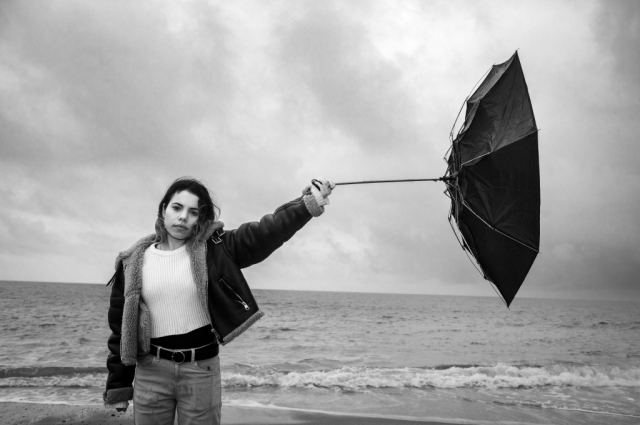 |
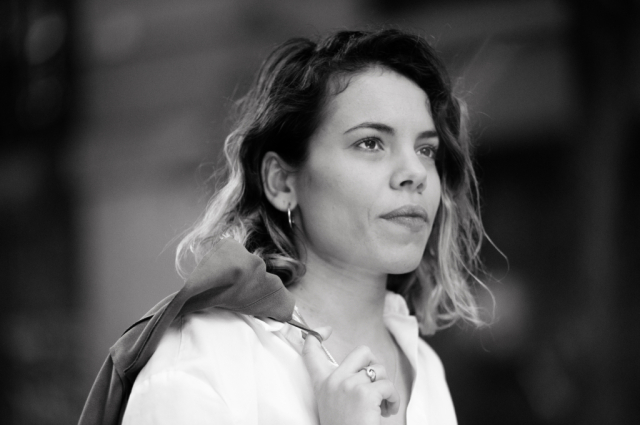 |
||
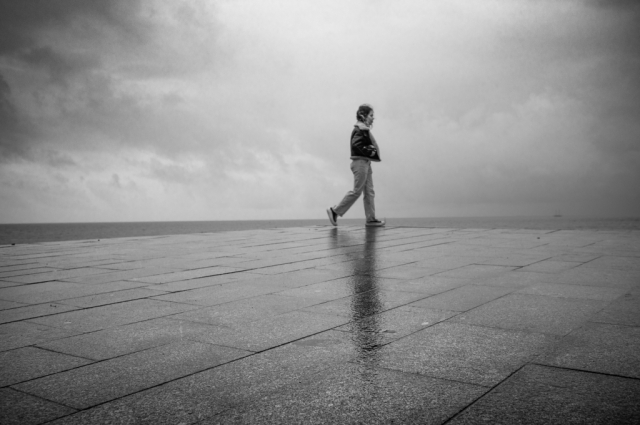 |
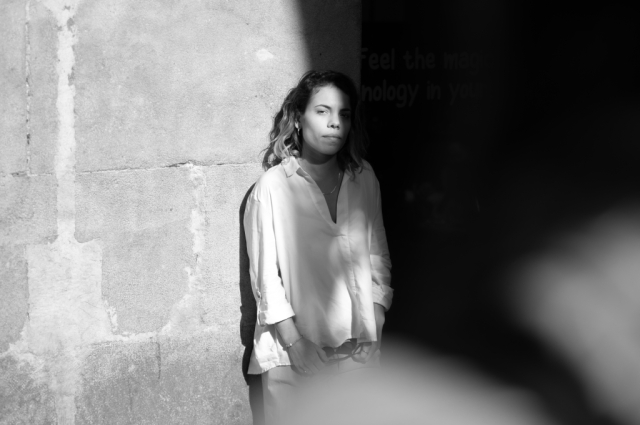 |
||
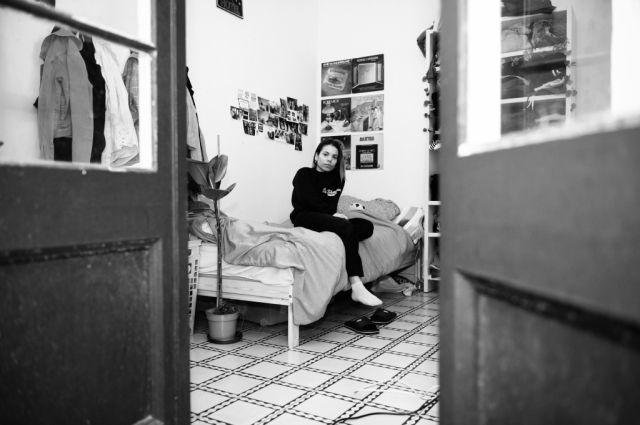 |
Click here to listen to other interviews.




